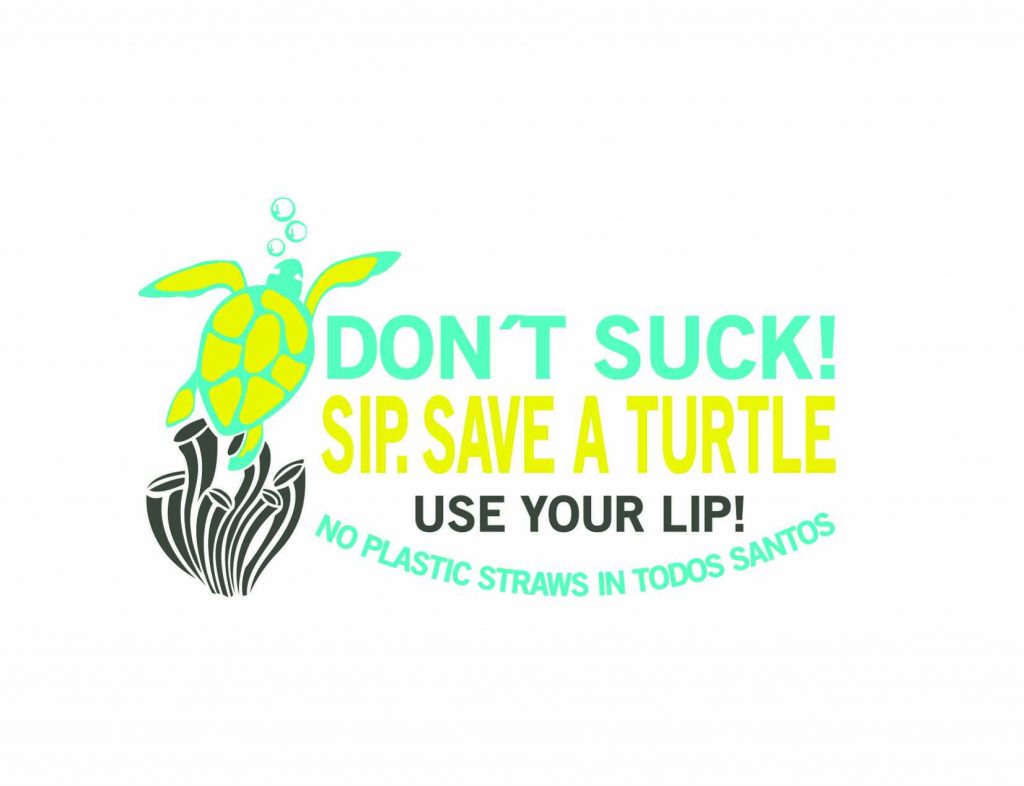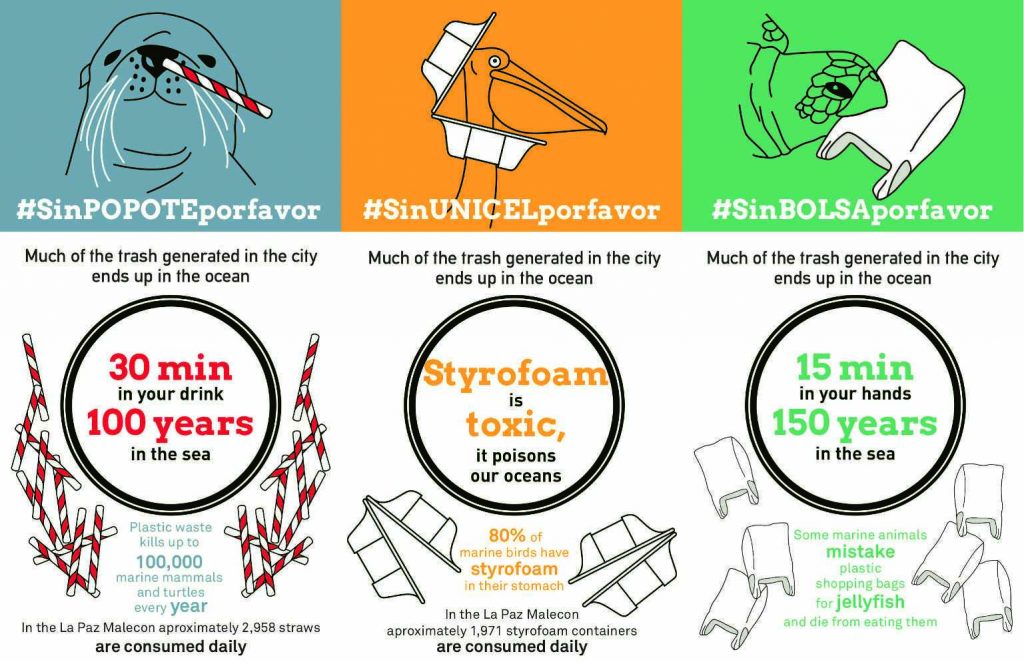There’s a sucker born every minute. That’s right. There’s a high possibility that you are personally a sucker, an even greater probability that most of your extended family members are suckers, and it is almost certain that your circle of friends and acquaintances suck too. How could we know such a thing? Simple mathematics. The United States is home to roughly 325 million people, yet the country uses 500 million plastic straws per day. That is to say, each person is using on average of 1.5 plastic straws per day. And that’s just one country. As a species, we suck on a global scale.
Of course, the thing that really sucks is that a huge percentage of these plastic straws are ending up in our oceans. The Earth Institute of Columbia University estimates that the Great Pacific Garbage Patch is twice the size of the continental United States. Of all that garbage, an Ocean Conservancy study concludes that fully 60% of it consists of items that society terms “disposable,” plastic bags, food containers, plastic bottles, and plastic straws. The Ocean Conservancy estimates that a plastic straw, used for 15 to 30 minutes to consume one drink, can take up to 100 years to decompose. A plastic bag that you use for 15 minutes to transport your purchase from store to home, can take 150 years to decompose. Plastic bottles can take up to 450 years.
So, that sucks, but why should us suckers care? Turns out plastic, it’s what’s for dinner. A recent study by the Ryan Institute concludes that 70% of fish in the North Atlantic have ingested plastic. Another study by Ghent University in Belgium estimates that shellfish lovers are eating upwards of 11,000 plastic fragments in their seafood each year. That plastic straw that seemed so harmless in your drink at lunch could actually come back to haunt you in your seafood dinner. And that’s the thing: plastic is personal. Which is why towns across Baja California Sur, including Todos Santos, Pescadero, La Paz, Cabo Pulmo, and Los Barriles are taking a stand against plastic straws and other single-use plastics. Baja is a strip of land bounded by two oceans, so what we do in our towns has an immediate impact on our oceans. Baja is the place where five of the world’s seven sea turtle species come to nest (sea turtles mistake plastic bags for their favorite food, jelly fish, and die from ingesting the plastic; plastic straws also get stuck in their nostrils and air passageways); it is home to 39% of the world’s total number of marine mammal species (sea lions and others are getting entangled in plastic bags and packing bands, and dying from infection or strangulation); it is where one third of the world’s whale and dolphin species spend their time (a dead sperm whale was recently found with 29 kilos of plastic in its stomach); it is a critical part of the Pacific flyway and home to over 430 bird species (National Geographic states that 90% of sea birds are ingesting tiny bits of plastic that they lethally mistake for food); and the Sea of Cortez alone is the home of 891 fish species that supply over half of Mexico’s fisheries, from whence we get our seafood dinners. So, ridding the area of single-use plastics is a deeply personal matter for residents of Baja. Says Mayra Victoria Gutierrez Sandoval, leader of the Déplastificate movement in Baja Sur, “Every time you personally consume a piece of plastic, you have to be personally responsible for what happens to it. That is the only way to eradicate the problem.”
Teresa Egea, Manager of Gardens, Sustainability & Spa at the hotel Rancho Pescadero and its Garden Restaurant, firmly believes in taking personal responsibility for reducing the use of plastics. “My philosophy is to practice the R’s, which are not only reduce, reuse, and recycle, but also reinvent and redistribute. I came to Rancho Pescadero six months ago and wanted to reinvent the use of the popote (straw). Our mixologist is from Oaxaca, where he developed a project of plant-based straws created by local communities with local plants, specifically Arundo donax, a type of cane. These straws are very beautiful, washable and reusable, and our guests love them, not only because they are enjoyable to use, but because they represent a sustainable alternative to plastic, and redistribute income away from plastic producers to local communities. Moreover, since we switched from plastic straws to the cane straws, our straw costs have declined by 2.5 times—it is a very profitable option and therefore a sustainable option for the business as well.”
Marimar Higgins, owner of La Esquina restaurant in Todos Santos, has long been a proponent of no popotes and eliminating single-use plastics. “We are serving straws less and less, and the ones we do serve are made out of paper. Almost all of our to-go containers are biodegradable, and we charge five pesos for all to-go items to make people think twice before taking away.”
Michael and Pat Cope of Michael’s at the Gallery restaurant gave up popotes and plastic water bottles long ago as well. Reflecting on such trends, Jürg Wiesendanger, owner of Hotel Posada La Poza says of the Déplastificate movement in Baja, “It is like banging on an open door.” And that is the exciting thing. While the movement to rid Baja of single-use plastics is gaining new momentum, restaurants like Posada La Poza’s El Gusto! gave up plastic straws a while ago and are currently evaluating how best to continue their forward momentum. Plenty of local companies are charging ahead. Alma and Manny’s, a much-loved local restaurant, stopped giving patrons plastic straws a year ago. New fish taco restaurant Santo Chilote not only doesn’t offer popotes to its patrons, it offers a discount to diners who bring their own takeaway containers. Landi Ortega eliminated popotes at her restaurant, Landi’s, over a year ago; Chef Sergio Rivera eliminated them from his restaurant La Casita a month ago; the Hotel Guaycura and its restaurants are celebrating their first popote-free season; and El Refugio owner Rachel Glueck has never had a popote on her premises. Feliz Ramon Vazquez Guluarte recently implemented a new program at his coffee shop, Cafélix, and now uses only compostable straws and glasses and environmentally-friendly take-out containers. Joella Parsons, owner of Pura Vida, is doing the same. Other businesses like La Morena, Fonda El Zaguán, La Santeña, Que Rico, Gallo Azul, Caffé Todos Santos, Café Santa Fé, Los Adobes and Cerritos Surf Town are actively working on their strategies for eliminating single-use plastics.
The Todos Santos Restaurant Association (Canirac) is totally committed to the movement. “To protect our oceans, sea turtles and other marine life, each restaurant that belongs to our association is committed to eliminating the use of plastic straws as a first step to becoming “green” restaurants. Our goal is to replace all single-use plastics with products made of compostable materials. The restaurant industry is united with the other sectors to make Todos Santos a town without single use plastics.”
That, most emphatically, does not suck! So next time you’re in a restaurant in Baja California Sur, don’t be a sucker. Ask for your drink “Sin popote por favor.” The sea turtles thank you!
RESOURCES FOR LOCAL BUSINESSES AND COMMUNITY MEMBERS:
For more information on the Déplastificate movement in BCS please visit their Facebook page at: https://www.facebook.com/DesplastificateMX/
If you’re a local business looking for suppliers of non-plastic solutions to your business needs, and/or artwork and other informational tools for your employees and clients, please email Mayra Gutierrez at ponguinguiolalpz@gmail.com or Bryan Jáuregui at tsecoadventures@gmail.com
For recycling solutions in Todos Santos and Pescadero, please contact Alex Miró at:
https://www.ecorrrevolucion.org


